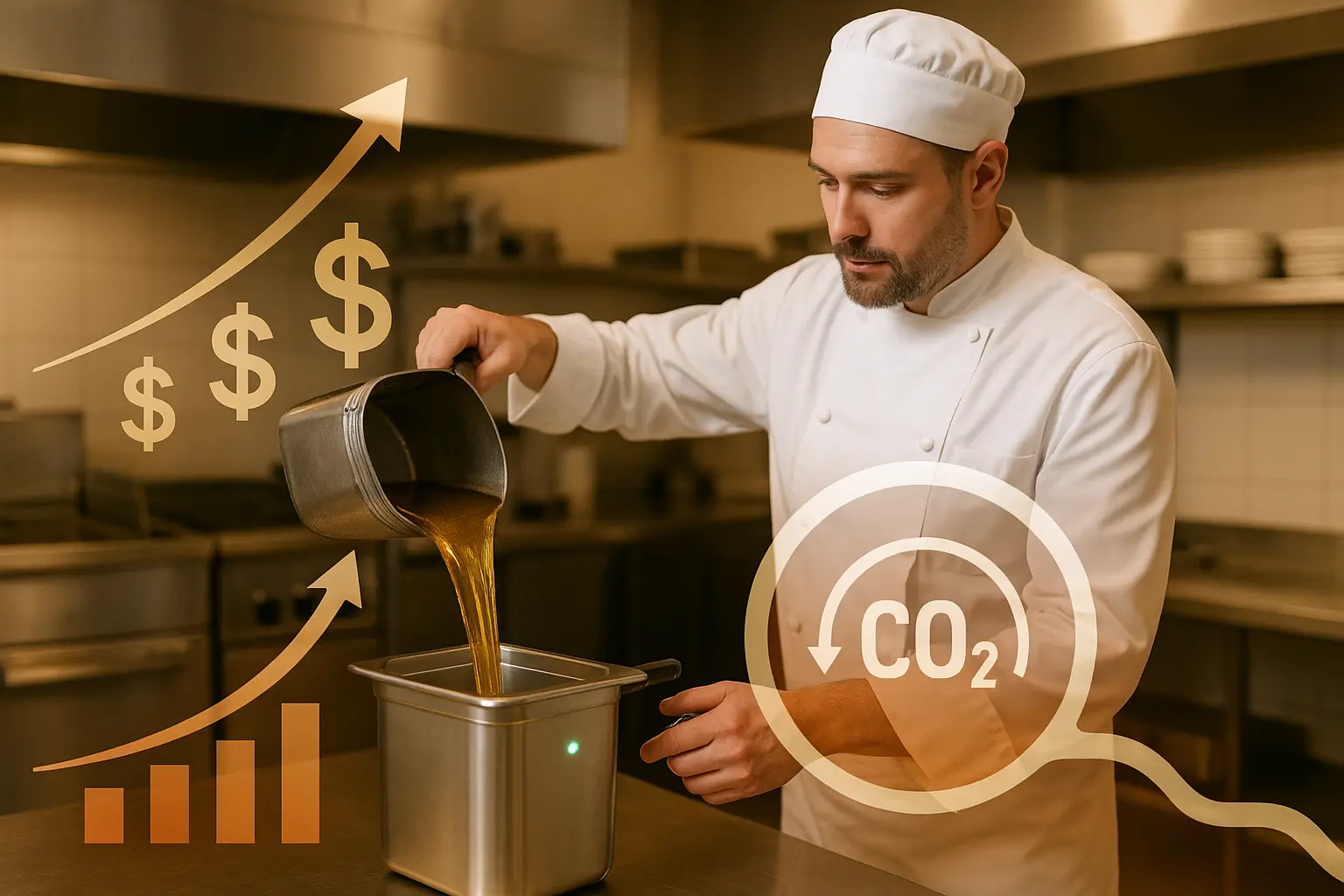The New Math of “Green ROI”
ROI used to stop at operating margin; now lenders, inspectors, and diners weigh sustainability with equal force. A professional UCO recycling program converts an expense line, pay to dump grease, into a traded commodity that feeds renewable diesel. In 2025, UCO rebates range from 10 to 50 cents a gallon, enough for most independent restaurants to break even within a single billing cycle. Add verifiable carbon cuts and you gain leverage with green loan programs and franchise growth metrics. By shifting fryer oil from landfill material to circular fuel feedstock, you create a blended return that satisfies both the CFO and the CSO without changing the menu.
Dollars and Cents: From Fees to Rebates
Most haulers still bill $50 to $150 per pick up, and charge landfill gate fees on top. UCO recyclers pay you instead. At a mid volume kitchen producing 600 gallons a year, even a modest $0.30/gallon payout swings cash flow from negative $900 in disposals to positive $180 in net revenue.
| Cost Item | Old Disposal | Pro UCO Program |
|---|---|---|
| Monthly service charge | $75 | $0 |
| Rebate per gallon | $0 | $0.10 to $0.50 |
That pivot doesn’t account for avoided dumpster rentals or grease trap pump outs, line items that quietly erode profit margins. Detailed statements from reputable collectors double as audit trails for lenders and franchisors, reinforcing the financial credibility of the switch.
Compliance & Safety: Slashing Liabilities
Grease spills trigger FOG violations that start at $1,000 and climb to $10,000 for repeat offenses. Manual hauling also exposes staff to hot oil burns and slip and fall claims; Burger King cut such incidents to zero after installing closed loop oil systems. Professional recyclers use sealed containers with level sensors, schedule off peak pick ups, and issue digital manifests before inspectors arrive. That eliminates both paperwork panic and the risk of a Saturday night sewer backup. Factor in lower workers comp premiums and fewer emergency clean outs, and the “hidden” ROI can equal or exceed your quarterly oil rebate.
Carbon Math: Turning Grease Into Emission Credits
Each gallon of diesel emits roughly 10.21 kg of CO₂. Converting UCO into biodiesel lowers life cycle emissions by 74 percent, avoiding about 7.5 kg per gallon. A restaurant recycling 600 gallons therefore removes ≈4.5 metric tons of CO₂ annually, the same impact as taking an SUV off the road for twelve months. Those figures plug directly into ESG dashboards, municipal carbon disclosure forms, and even local grant applications, letting independent operators speak the same language as publicly traded chains.
Brand Lift: Diners Will Pay for Greener Fries
Sustainability is no longer a feel good extra; 90 percent of diners now prefer restaurants with visible green practices, and they’ll spend roughly 9 percent more for them. Posting annual “grease to green” stats on menus and social feeds turns a back of house routine into share worthy storytelling. Early adopters report local media coverage, partnership invites from food rescue groups, and a measurable uptick in repeat traffic. With menu prices under scrutiny, credible carbon claims give guests a reason to choose, and champion, your brand.
The Five Number Green ROI Calculator
All you need:
- Gallons of oil per month
- Current disposal fee per pickup
- Market rebate per gallon (ask your collector)
- Typical FOG fine risk (use last year’s violations)
- CO₂ saving factor = 7.5 kg per gallon
Financial ROI % = (Rebates + Fees Avoided + Fine Risk Avoided – Program Cost) ÷ Program Cost × 100
Pair that with total CO₂ avoided to report a blended “green ROI” that marries dollars with emissions, a metric investors and regulators increasingly expect. Provide the calculator on your site or hand it to your accountant; the math is straightforward, the story powerful.
Choosing a Recycling Partner
Vet providers the way you’d vet a food supplier:
- Transparent terms: no cart rental fees, weekly emailed volume slips.
- Smart routing: pickups triggered by fill level sensors, not rigid calendars.
- Compliance support: instant manifests and FOG permit assistance.
- Scalable hardware: 55 gallon drums up to 300 gallon indoor tanks with pumps.
- Fair exit clauses: free tank removal, no penalty for switching.
Ask point blank about minimum volumes for rebates, equipment hygiene schedules, and emergency response times. The cheapest quote on Day 1 can become the costliest mistake by Year 3 if service lags or reports don’t satisfy inspectors.
Ready to Capture Your Green ROI?
Schedule a 10 minute volume audit. Your fryer oil could be earning cash, and cutting carbon, before your next oil change.









